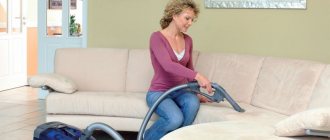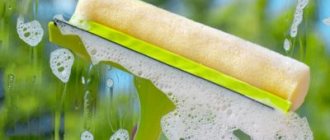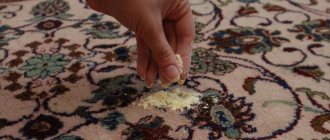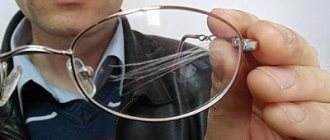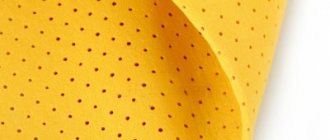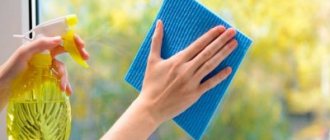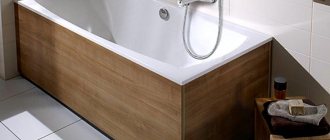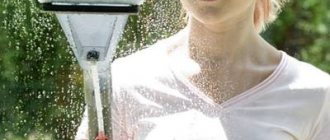Window cleaning includes cleaning the glass and removing streaks.
At the same time, it is important to achieve complete transparency, and this requires not only removing dust, but also dealing with drips and dried stains.
Simple home remedies based on vinegar will help to carry out high-quality cleaning. This publication will tell you more about how to clean windows with vinegar.
How to wash fixed windows?
Prepare two buckets in advance - for washing and rinsing. Place the sponge part of the nozzle into a container with detergent and wash the outside of the window. Then rinse the sponge in clean water and remove soap stains. Turn the device over and use a rubber scraper to drive excess water to the bottom of the glass unit.
Interesting materials:
What can you plant flowers at home? What can you see in Budapest with children? What can you put in the corner of the hallway? What can you put on the floor on the veranda? What can you bring from Finland? What can you bring to Goa? What can you bring as a gift from the Czech Republic? What can be placed between the gas stove and the furniture? What can you take in luggage on a plane? What can you carry in your hand?
Features of using glass cleaner
Table vinegar is a food product based on acetic acid. This substance allows you to completely eliminate stains and carry out high-quality polishing of a smooth glass surface.
The effect of this use is based on the chemical properties of acetic acid . It is able to cope with various contaminants, acting as a solvent.
Using a vinegar solution is one of the most popular and inexpensive methods for cleaning windows, regardless of their size. The solution can be used on both external and internal surfaces.
How to wash windows
In addition to commercially available special cleaning products, there are proven homemade formulations. They are usually cheaper, but do not always meet quality requirements.
Ammonia
A cleaning solution with the addition of ammonia is easy to make. Recipe: for 3 liters of water - 3-4 ml of ammonia. Sometimes a little glycerin is added to the solution. In any case, the solution will have to be washed off several times with clean water until the glass becomes transparent.
Vinegar and citric acid
A popular home remedy that, in addition to removing dirt, has a disinfectant and insect repellent effect, which is especially important in the summer. Two glasses of warm water should be mixed with 100 ml of vinegar. To evenly apply the composition to the glass, it is better to use a spray bottle.
Vinegar has a specific odor that takes a long time to dissipate. Therefore, you can replace it with citric acid well dissolved in water or natural lemon juice. These options also allow you to clean the glass, but at the same time leave a pleasant, unobtrusive smell.
Tooth powder or regular white chalk (4–5 tbsp + 1.5 l of water) is applied to the glass after the main cleanser and left for an hour. Then the windows need to be wiped with a dry cloth or newspaper. Chalk absorbs moisture, it can be removed without damaging the glass, and there will be no streaks left.
Starch
The principle is the same as with chalk: 3-4 tbsp. l. starch is diluted in 1.5–2 liters of water, the solution is applied to the windows and left to dry. After this, you need to remove the composition from the glass with a dry cloth. The product weakens hydrogen bonds, preventing streaks. Some recipes advise adding alcohol and vinegar to the starch.
A cup of strong tea and 3 tbsp. l. Vinegar combined makes a good cleanser. Unlike “finishing” chalk and starch solutions, this composition must be applied after washing with soap, and then be sure to rinse with clean water and remove any remaining liquid.
Salt and soda
Two food items found in every kitchen are often used for cleaning purposes. They need to be completely dissolved in water so that small particles do not scratch the glass. It is enough to dilute a quarter glass of soda and the same amount of salt in 2 liters of water. You can add vinegar and alcohol to the composition. The resulting product removes fingerprints, children's drawings and insect traces well.
Special cleaning products
Most glass aerosols contain alcohol; it is safe, removes stains well and disappears quickly. Most often, such products are used for cleaning inside the apartment. The outside of the windows will most likely need to be washed more thoroughly; in this case, it is better to start with soap solutions or professional cleaning compounds.
It is not recommended to use dish soap, shampoos and washing powders. They form a lot of foam, which will be very difficult to wash off completely. Avoid compositions with abrasive particles: they may be suitable for window sills, but definitely not for glass - there is a risk of leaving scratches.
Alternative options
In addition to vinegar, other products found in the house will help you wash windows quickly and thoroughly.
Ammonia
This component is often included in ready-made industrial cleaning products. You can also use it in solutions you make yourself.
Procedure:
- Pour 1 liter of water into a container.
- Pour in 10 ml of ammonia.
- Mix.
For complex stains and advanced cases, it is recommended to strengthen the composition by adding vinegar.
Chalk
To remove most of the dirt from windows that are too dirty, you can use tooth powder or chalk. For these purposes, 50 grams of the dry component are diluted in a liter of water.
After the mixture is applied to the glass, it is allowed to dry . After this, the composition can be easily removed with a rag or napkin.
For advanced cases, the solution may not be enough - in this case, a paste of chalk and water is prepared. Usage is similar.
Glycerol
Due to its properties, glycerin cannot be used to remove dirt and stains. Its value lies in its ability to add a final shine to the glass surface after it has been washed.
The use of glycerin slows down the settling of dust on the glass, allowing it to stay clean longer.
Why do windows sweat?
There are a number of reasons for the formation of condensation on plastic windows. Moreover, this problem does not always appear immediately after installing a new double-glazed window. It happens that the renovation was completed long ago, the window structure held the heat well for two or three years, and suddenly the glass began to become covered with moisture. What is the reason for such trouble?
- Poor air circulation in an apartment is the most common cause of condensation on glass. If forced ventilation is not installed in the kitchen, and the area of the room is small and something is constantly being cooked and fried on the stove, fogging of the windows in the house cannot be avoided. The situation will be aggravated by laundry hanging out to dry and a lot of indoor plants, which increase the already high humidity in the room. Streams of warm air collide with cold glass and leave wet marks.
- It's cold inside. Often, residents experience window fogging in the wet, cold autumn, when the heating in the apartment is not yet turned on, and there is slush and bad weather outside the window. Also, a similar problem can arise due to insufficient heating or improper installation of window sills. If the window sill prevents the passage of warm air from the radiator to the double-glazed window or the window is covered with thick curtains, then wet drops will certainly appear on the glass, and ice will appear on the profile.
- Incorrect glass unit selected. Double-glazed windows with more than two chambers are suitable for glazing residential premises. Inexpensive two-chamber packages are not able to properly retain heat in the apartment.
- Poor quality fittings. Plastic windows can sweat due to loose fitting of the sashes to the frame and lack of necessary insulation.
- Defects made by workers during installation of the structure. If a plastic window is installed poorly, cracks and gaps may remain between the wall of the window opening and the frame, where cold air from the street will enter. This will lead to fogging of the glass, and the problem will appear in the first winter after installing the window.
- Unadjusted fittings and worn rubber seals can also cause condensation to form on the windows. Frosty air from the street will penetrate into the cracks and holes of the seal, resulting in the formation of ice and condensation on the window.
To prevent the plastic window from sweating and the glass to remain clean and transparent, it is necessary to carry out timely maintenance of the PVC structure: lubricate and tighten the fittings, take care of the seal, and remove moisture accumulated between the chambers.
Useful tips
And finally, I want to share with you some effective tricks that will further simplify the process of cleaning glass.
- It is better to choose a cloudy day for washing windows . No, you definitely shouldn’t do this when it’s raining, but a few clouds in the sky would be nice. Under the scorching rays of the sun, the product dries quickly, which is fraught with stains, but in cloudy weather you will have more time for quality cleaning.
- Before washing the windows with vinegar, run a vacuum cleaner along the edges of the frames, collecting dust and dirt from them . Agree, this method is much more effective than smearing with a rag.
- Note to motorists! Don’t forget that the product described is good not only for washing windows, but also for cleaning car windows and making them shine.
- Don't forget to use rubber gloves while cleaning . They will protect the skin of your hands from irritation and redness.
Don't forget to protect your hands while cleaning
Answers to frequently asked questions
Before washing the glass unit for the first time, the factory protective film is removed from it. If this is not done, it will stick tightly to the surface under the influence of high temperature. It will be almost impossible to clean it later.
- Plastic windows are washed from the outside from top to bottom, and from the inside from right to left. First you need to remove the main contamination, and then rinse the clean surface to remove any remaining detergent. At the very end of the work, the glass is rubbed to a bright shine.
- A solution of vinegar (100 ml or less) per liter of water will help you wash your apartment windows. Conveniently, water and vinegar can also be used as a rinse aid.
- Plastic windows cannot be cleaned with metal sponges and rough brushes, because they can easily damage the surface of the frames and glass units.
- Special store-bought sprays for plastic windows handle cleaning most quickly and efficiently. The product is sprayed over the entire surface in frequent zigzags, and then wiped with a soft cloth. For convenience, a screed is also used, which ideally removes dirty stains. If the model is equipped with a long handle, it can also be used to wash glass from the outside.
- First you should wash the frames, all working mechanisms, glass and only then the window sill.
- Wet wipes designed for window care work well with light soiling and can only be used to maintain cleanliness.
- It has been experimentally found that it is worth washing windows in warm, cloudy, windless weather or when the sun does not hit the window. This will allow you to wash the surface without streaks, otherwise the sun's rays or wind will quickly dry the glass, causing rainbow spots to appear.
How often windows need to be washed is decided by each housewife independently, based on objective factors. For example, owners of apartments on the ground floor or residents of a house located along a highway will have to do this at least once every three months. But in any case, it will not be difficult to cope with this task if you have modern or homemade window glass care products at hand.
Features of window cleaning
It is better to use a separate rag for cleaning windows.
To carry out the procedure correctly and with maximum efficiency, you must follow these rules:
- Remove everything unnecessary from the windows.
- Do not use soda to wash frames, as it will destroy the structure and corrode the paint.
- Do not carry out the procedure if the weather is windy or hot, otherwise stains cannot be avoided.
- To prevent condensation from accumulating, wipe the glass with glycerin and alcohol, and also ventilate the room.
- In winter, use a saline solution to wipe glass. It will provide shine to the glass.
- You need to start washing from the inside, then the outside.
- Finally, wipe the glass vertically, then horizontally. This will prevent streaks from occurring.
- You should start washing from the top so that the dirt flows down.
- If there are small cracks in the glass, cover them with clear varnish. It will prevent the cracks from spreading further.
Cleaning is carried out as follows:
- First the frames are washed. Do not use powdered products, which may leave scratches on the surface. If the glass unit is coated with energy-saving coating, then aggressive solutions cannot be used, as they will wash it out. It is better to give preference to gentle drugs. A soap solution with dish gel is good for washing the frame. It is applied to the surface with a sponge and washed off with warm water. Wooden frames are washed with tea leaves.
- After this, they begin to remove contaminants from the glass using the prepared solution or purchased product.
- At the end, they remove soap stains. First, the glass is washed with cool water. After this, wipe with a paper towel or microfiber cloth.
For the procedure, you can use different means. Not only chemical ones are effective, but also recipes used from time immemorial.
Benefits of homemade cleaning mixtures
By making your own detergent, you can be sure of its absolute safety, since you know exactly all the components. While modern household chemicals are simply replete with various additives, have a very strong chemical smell and are unsafe for children.
An undoubted advantage of the home remedy is its low cost. This way you can save significantly on the purchase of household chemicals, since the prices for them in stores are very high and leave much to be desired.
An environmentally friendly detergent is especially important for people prone to allergic reactions and families with small children. And also such a need arises in a situation when, during general cleaning, the detergent suddenly runs out, and there is simply no time to be distracted to go to the store.
Safe products and tools
Use only soft cloths and tools, as glass is very easy to damage
You need to take care of frosted glass doors, furniture sets, and sinks using devices that are safe for coating.
Suitable for surface:
- Synthetic suede cloths. It has a multi-layer porous structure, which allows it to absorb moisture well. Another plus is the absence of lint in the composition, so it does not remain on the matte surface.
- Microfiber cloths. They are comfortable, smooth, and do not leave streaks.
- Magnetic sponges. This is a device with a sponge and a scraper, which are located on each side. They have a built-in magnet. Using a magnetic sponge, you can firmly press the soft sponge onto the glass and ensure that there are no streaks and that dirt is removed.
- Melamine sponge. They effectively wash dirty matte surfaces even without using a cleaning agent. Old greasy stains can also be removed with a melamine sponge.
A steam mop is a device that safely removes carbon deposits and grease from matte surfaces, even if the stains are old. The nozzles are made of microfiber, so you don’t have to worry about the condition of the coating.
Safe household chemicals: how to choose
"Mr. Muscle" effectively cleans glass surfaces
You can clean dirty frosted glass on a door at home using household chemicals.
When choosing them, you need to pay attention to the composition
To remove stains, do not use detergents that contain alkali, acids and silicone. Organic solvents and powders are also prohibited. All these substances erase the matte coating.
It is not recommended to use regular soap: it leaves a lot of stains that are difficult to get rid of.
You can wash off water deposits on glass, traces of stickers and grease using the following chemicals:
- Glass liquids: “Mr. Muscle”, “Fratty Cleaner”, “Clin”.
- Dishwashing gels: “Fairy”, “Gala”, “Pril”, “Cinderella”.
- Universal products for cleaning various surfaces. Compositions such as Amway LOC and Profoam 3000 are safe for frosted glass.
- "Ajax" is a special product for adding to a steam cleaner. It will help clean the glass, even if the stains are old.
Folk remedies: their advantages and disadvantages
You can clean surfaces with a matte finish using traditional methods. Their main advantages are the availability and safety of the composition. Although improvised means are inferior to industrial ones in efficiency, they still produce results.
Popular methods:
- Laundry soap shavings. Grate half the bar on a coarse grater and add a little soapy water to obtain a saturated soap solution. Dampen a soft sponge and wash contaminated surfaces. The composition copes with fresh greasy stains, so it is suitable for caring for matte oven doors.
- Liquid soap with glycerin. Combine a few tablespoons of liquid soap with a teaspoon of glycerin. Apply the composition to the surface, wait 10 minutes, then rub gently. The product is suitable for combating old grease stains.
- Vinegar solution. Combine half a glass of vinegar at a concentration of 9% with a liter of water. Place the container on the stove and heat it under a closed lid to 50 degrees. Dampen a napkin or sponge in the solution, wipe the surfaces, then rinse with clean water and wipe the glass dry.
- Solution with citric acid. It is effective in removing limescale that often appears on shower doors. To prepare, dissolve 20 g of acid in 200 ml of warm water and mix. Pour the solution into a spray bottle, spray the composition on the surface and leave for 15 minutes. Afterwards, wipe the door with a soft sponge and rinse with warm water.
- Composition with starch. This product will cope with minor stains. Place a spoonful of 18 g of potato starch in a liter of water and stir thoroughly. Wipe the glass elements, rinse with cold water, and wipe dry.
- Composition with hydrogen peroxide and ammonia. The components must be combined in equal proportions. Dip a sponge in the resulting mixture and treat the contaminated areas. This product is suitable for cleaning fireplace glass.
- Paste for removing rusty deposits from frosted glass. Mix finely ground table salt and lemon juice (a tablespoon each) in equal proportions and apply to the stained area without rubbing. Leave for 10 minutes, then remove and remove any remaining residue with cool water. This product will also help clean the fireplace glass from soot and burnt marks.
When working with compounds that are aggressive to the skin, such as vinegar and ammonia, you need to protect your hands with rubber gloves.
The procedure for preparing and proportions of the cleaning composition
Depending on the complexity of the task and the degree of contamination of the windows, you can prepare a more or less concentrated cleaning solution.
Popular recipes are designed to use vinegar, not vinegar essence, a much more concentrated preparation.
Standard solution recipe
For periodic washing of glasses and keeping them clean, the best option would be a non-concentrated vinegar-based composition.
You will need the following components:
- water – 0.5 l.;
- ¼ cup vinegar;
- ½ tsp. dishwashing gel.
After mixing all components, the product is ready for use. This solution is suitable if the windows are not in a state of disrepair and do not have stains or streaks.
Concentrated
To tidy up dirty windows, it is better to use a product that is quite rich in its composition. You will need the following ingredients:
- 1 tbsp. vinegar;
- 1 tbsp. water.
Mix both liquids and pour into a convenient container. This solution can be made in advance and used as needed.
Clean
For windows that are in disrepair, you can use undiluted table vinegar. For ease of use, it can be poured into a spray bottle.
Vinegar
Vinegar is the most commonly used element for preparing homemade products for cleaning not only glass, but also floors, kitchen appliances, tiles, glossy stretch ceilings, etc. The product does an excellent job of removing old fatty deposits. Therefore, removing dirt from glass is not a difficult job for him.
The easiest way to use vinegar is to dilute it in warm water. You need to take 50 ml per glass. For convenience, you can use a spray bottle. All you need to do is spray the solution over the entire window area and wipe with a clean rag or napkin.
Haven’t yet chosen a method for yourself and haven’t decided how to wash windows without streaks at home with vinegar? Here's another effective method. Just to do this you will need to take a few more ingredients:
- 1 tbsp. l. ammonia;
- 50 ml vinegar;
- a few drops of dishwashing detergent;
- a glass of warm water.
All these ingredients are mixed. The solution is poured into a spray bottle. The entire window area is generously sprayed, including the window sill, frames, and handles. Now you can go over them with a clean cloth. The product perfectly fights against any kind of pollution.
Interesting! How to remove grease from kitchen furniture at home
Washing windows with a steam cleaner/vacuum cleaner
If the question arises of how to wash balcony windows and remove dirt from a large number of glasses in the apartment, then you can use a steam cleaner. The most famous brand is Karcher, but equipment from any other manufacturer will do. It is better to remove the screen from the windows and wash it with a steam cleaner in the bathroom, since water will run out when washing.
Using special vacuum cleaners, you no longer need to think about how to wash streak-free windows at home, since the water and detergents are supplied under pressure. As a result, the glass remains perfectly clean and shiny. Remember that a lot of water is generated. Place a dry cloth on the windowsill.
Is it possible to wash windows with vinegar solution?
Regular table vinegar added to water allows you to wash window glass without streaks. Moreover, vinegar further protects the surface from new contaminants. This food product has long been used by housewives as a universal household cleaner.
Attention! Use a table vinegar solution, not a high concentration of essence!
How to clean without streaks?
Before you start cleaning windows with a vinegar solution, you need to prepare:
- Remove dust from the glass using a dry cloth or rag.
- Remove objects located close to the window that you do not want to get vinegar on.
- Remove or move curtains.
- Cover the window sill.
After preparation, you can proceed directly to washing. You need to act gradually, treating each glass separately. They move on to the next one only after the previous one has been cleaned and wiped dry.
To clean small windows, it is convenient to use a spray bottle. But for large window openings it is better to choose to apply the composition with a sponge.
Window cleaning procedure:
Apply the vinegar solution in a convenient way (with a sponge or spraying it from a bottle onto the glass), spreading it over the entire surface of the glass.- If the stains cannot be removed immediately, the problem areas can be rubbed.
- Wipe small windows with a napkin, large windows with a scraper with a rubber nozzle.
- Wipe dry, paying attention to corners and areas near the frame.
To wipe glass, it is advisable to use a lint-free cloth, for example, microfiber.
Store funds
Nowadays, stores are full of all kinds of window cleaning products, and they are all expensive.
Their price is understandable: production costs, wages to workers, promotion of goods, and other expenses need to be recouped, and even gain a little money so that the owner of the “brand” can buy himself a small island in the Mediterranean Sea. The buyer's pocket suffers from this. Most often, solid particles (dust, grains of sand) and greasy particles (fingerprints, insect marks, greasy deposits from the stove) collect on the windows. Only a high-quality window cleaner can deal with all these contaminants.
The composition of purchased products usually includes: water (universal solvent), ethyl alcohol, surfactants (surfactants).
- Alcohol dissolves everything that water could not dissolve. In addition, it increases the penetrating properties of the liquid, helps it absorb into the cloth and is easily removed without leaving streaks.
- Surfactants provide the cleaning power of all store-bought products. They effectively remove both hard and fatty particles.
- Some products may contain ammonia for better grease removal.
So, we all know in practice that store-bought products are quite effective. And they are sold in special plastic containers with a dispenser, which are very convenient to use. However, they are too expensive and often cause allergies.


